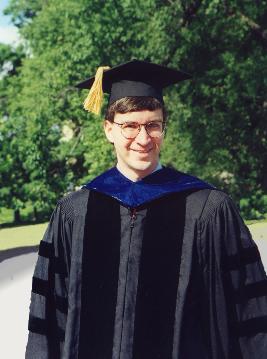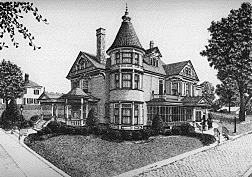 At JHU Commencement, May 27, 1999
At JHU Commencement, May 27, 1999
Recently Smithfield has, much to my surprise, gone both touristy (trying to compete with nearby Colonial Williamsburg) and high-tech. Like everything else in the universe, it's on the web now. So you can check out Smithfield hams yourself. Also places like the seafood restaurant and inn Smithfield Station . The Hallwood Enterprises page on Smithfield web page features my pen-and-ink drawing of the Isle of Wight County Museum, adapted from an etching circa 1910 or so, when the building was the relatively new Bank of Smithfield.
Smithfield seems to be attempting to make itself into the antiques shopping mecca of southern Virginia. I don't know whether this is a good thing or not, though it certainly is a change from the Smithfield where I grew up. Another change is that Smithfield Foods has become a Fortune 500 company, which has certainly had its impact upon the town; in particular, CEO Joe Luter has practically razed the orginal Pagan River waterfront along Commerce Street (not that there was much of anything there worth preserving or even mentioning, within my lifetime) and replaced it with a huge brick corporate headquarters, town municiple government buildings, theater, fishing pier, etc. Oh, and hurricane Isabel had a particularly nasty impact on the area in 2003, removing a large number of trees, piers, and a number of entire houses as well.
 This is the house I grew up in.
This is the house I grew up in.
Hurricane Floyd in September, 1999, dumped over 15 inches of rain on the area and did heavy erosion damage to the cliff behind the house. Smithfield was better off than Franklin, Virginia, where my father works one day a week in district court, which was drowned under 12 feet of water, covering much of the downtown area. Nothing like that ever happened while I was living there!
Hurricane Isabel in 2003 (do you see a pattern here?) once again ripped up the area. As the hurricane made landfall in North Carolina and moved northward (later causing considerable amounts of damage way up into central Maryland where I live), much of the bulk of the hurricane was still in the Atlantic. Its counterclockwise movement brought it pretty much unchecked across the lower Chesapeake bay, so that it hit areas along the James River with devastating force. The riverside community of Burwell's Bay simply disappeared. Trees were down in just about every single yard, and my parents lost all but the last two of the original cedars.





My main research interest at APL was in Analog VLSI adaptive systems, though I also dabbled in optics, acoustics, field-programmable array architectures, and MEMS.
![]()
| | email: | 
|
Last updated: April 9, 2012 at 2:20pm